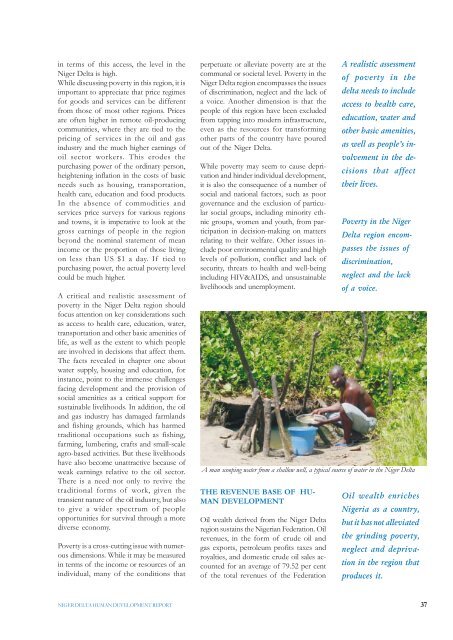Niger Delta Human Development Report - UNDP Nigeria - United ...
Niger Delta Human Development Report - UNDP Nigeria - United ...
Niger Delta Human Development Report - UNDP Nigeria - United ...
Create successful ePaper yourself
Turn your PDF publications into a flip-book with our unique Google optimized e-Paper software.
in terms of this access, the level in the<br />
<strong>Niger</strong> <strong>Delta</strong> is high.<br />
While discussing poverty in this region, it is<br />
important to appreciate that price regimes<br />
for goods and services can be different<br />
from those of most other regions. Prices<br />
are often higher in remote oil-producing<br />
communities, where they are tied to the<br />
pricing of services in the oil and gas<br />
industry and the much higher earnings of<br />
oil sector workers. This erodes the<br />
purchasing power of the ordinary person,<br />
heightening inflation in the costs of basic<br />
needs such as housing, transportation,<br />
health care, education and food products.<br />
In the absence of commodities and<br />
services price surveys for various regions<br />
and towns, it is imperative to look at the<br />
gross earnings of people in the region<br />
beyond the nominal statement of mean<br />
income or the proportion of those living<br />
on less than US $1 a day. If tied to<br />
purchasing power, the actual poverty level<br />
could be much higher.<br />
A critical and realistic assessment of<br />
poverty in the <strong>Niger</strong> <strong>Delta</strong> region should<br />
focus attention on key considerations such<br />
as access to health care, education, water,<br />
transportation and other basic amenities of<br />
life, as well as the extent to which people<br />
are involved in decisions that affect them.<br />
The facts revealed in chapter one about<br />
water supply, housing and education, for<br />
instance, point to the immense challenges<br />
facing development and the provision of<br />
social amenities as a critical support for<br />
sustainable livelihoods. In addition, the oil<br />
and gas industry has damaged farmlands<br />
and fishing grounds, which has harmed<br />
traditional occupations such as fishing,<br />
farming, lumbering, crafts and small-scale<br />
agro-based activities. But these livelihoods<br />
have also become unattractive because of<br />
weak earnings relative to the oil sector.<br />
There is a need not only to revive the<br />
traditional forms of work, given the<br />
transient nature of the oil industry, but also<br />
to give a wider spectrum of people<br />
opportunities for survival through a more<br />
diverse economy.<br />
Poverty is a cross-cutting issue with numerous<br />
dimensions. While it may be measured<br />
in terms of the income or resources of an<br />
individual, many of the conditions that<br />
NIGER DELTA HUMAN DEVELOPMENT REPORT<br />
perpetuate or alleviate poverty are at the<br />
communal or societal level. Poverty in the<br />
<strong>Niger</strong> <strong>Delta</strong> region encompasses the issues<br />
of discrimination, neglect and the lack of<br />
a voice. Another dimension is that the<br />
people of this region have been excluded<br />
from tapping into modern infrastructure,<br />
even as the resources for transforming<br />
other parts of the country have poured<br />
out of the <strong>Niger</strong> <strong>Delta</strong>.<br />
While poverty may seem to cause deprivation<br />
and hinder individual development,<br />
it is also the consequence of a number of<br />
social and national factors, such as poor<br />
governance and the exclusion of particular<br />
social groups, including minority ethnic<br />
groups, women and youth, from participation<br />
in decision-making on matters<br />
relating to their welfare. Other issues include<br />
poor environmental quality and high<br />
levels of pollution, conflict and lack of<br />
security, threats to health and well-being<br />
including HIV&AIDS, and unsustainable<br />
livelihoods and unemployment.<br />
THE REVENUE BASE OF HU-<br />
MAN DEVELOPMENT<br />
Oil wealth derived from the <strong>Niger</strong> <strong>Delta</strong><br />
region sustains the <strong>Niger</strong>ian Federation. Oil<br />
revenues, in the form of crude oil and<br />
gas exports, petroleum profits taxes and<br />
royalties, and domestic crude oil sales accounted<br />
for an average of 79.52 per cent<br />
of the total revenues of the Federation<br />
A realistic assessment<br />
of poverty in the<br />
delta needs to include<br />
access to health care,<br />
education, water and<br />
other basic amenities,<br />
as well as people’s involvement<br />
in the decisions<br />
that affect<br />
their lives.<br />
Poverty in the <strong>Niger</strong><br />
<strong>Delta</strong> region encompasses<br />
the issues of<br />
discrimination,<br />
neglect and the lack<br />
of a voice.<br />
A man scooping water from a shallow well, a typical source of water in the <strong>Niger</strong> <strong>Delta</strong><br />
Oil wealth enriches<br />
<strong>Niger</strong>ia as a country,<br />
but it has not alleviated<br />
the grinding poverty,<br />
neglect and deprivation<br />
in the region that<br />
produces it.<br />
37










